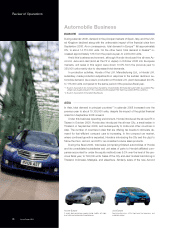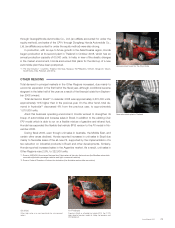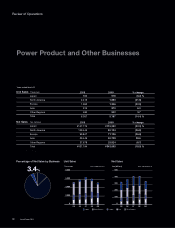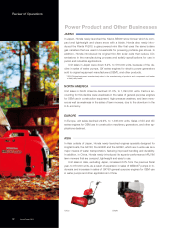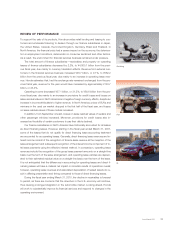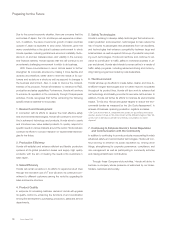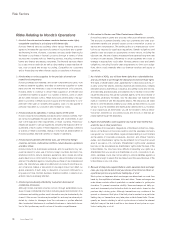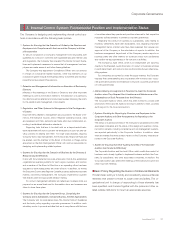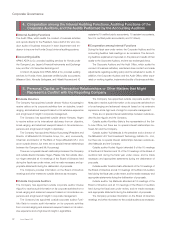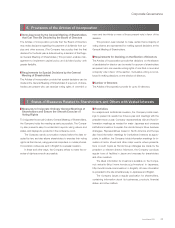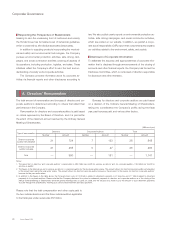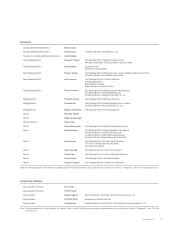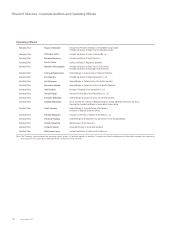Honda 2009 Annual Report Download - page 40
Download and view the complete annual report
Please find page 40 of the 2009 Honda annual report below. You can navigate through the pages in the report by either clicking on the pages listed below, or by using the keyword search tool below to find specific information within the annual report.6.Risk related to Pension and Other Postretirement Benefits
Honda has pension plans and provides other post-retirement benefits.
The amounts of pension benefits, lump-sum payments and other post-
retirement benefits are primarily based on the combination of years of
service and compensation. The funding policy is to make periodic contri-
butions as required by applicable regulations. Benefit obligations and
pension costs are based on assumptions of many factors, including the
discount rate, the rate of salary increase and the expected long-term rate
of return on plan assets. Differences in actual expenses and costs or
changes in assumptions could affect Honda’s pension costs and benefit
obligations, including Honda’s cash requirements to fund such obliga-
tions, which could materially affect our financial condition and results of
operations.
7.As a holder of ADSs, you will have fewer rights than a shareholder has
and you will have to act through the depositary to exercise those rights
The rights of shareholders under Japanese law to take various actions, in-
cluding voting their shares, receiving dividends and distributions, bringing
derivative actions, examining a company’s accounting books and records,
and exercising appraisal rights, are available only to holders of record. Be-
cause the depositary, through its custodian agents, is the record holder of
the Shares underlying the ADSs, only the depositary can exercise those
rights in connection with the deposited Shares. The depositary will make
efforts to vote the Shares underlying your ADSs as instructed by you and
will pay to you the dividends and distributions collected from us. However,
in your capacity as an ADS holder, you will not be able to bring a deriva-
tive action, examine our accounting books and records or exercise ap-
praisal rights through the depositary.
8.Rights of shareholders under Japanese law may be more limited than
under the law of other jurisdictions
Our Articles of Incorporation, Regulations of the Board of Directors, Regu-
lations of the Board of Corporate Auditors and the Japanese Company
Law govern our corporate affairs. Legal principles relating to such matters
as the validity of corporate procedures, directors’ and officers’ fiduciary
duties, and shareholders’ rights may be different from those that would
apply if we were a U.S. company. Shareholders’ rights under Japanese
law may not be as extensive as shareholders’ rights under the laws of the
United States. You may have more difficulty in asserting your rights as a
shareholder than you would as a shareholder of a U.S. corporation. In ad-
dition, Japanese courts may not be willing to enforce liabilities against us
in actions brought in Japan that are based upon the securities laws of the
United States or any U.S. state.
9.Because of daily price range limitations under Japanese stock exchange
rules, you may not be able to sell your shares of our Common Stock at
a particular price on any particular trading day, or at all
Stock prices on Japanese stock exchanges are determined on a real-time
basis by the equilibrium between bids and offers. These exchanges are
order-driven markets without specialists or market makers to guide price
formation. To prevent excessive volatility, these exchanges set daily up-
ward and downward price fluctuation limits for each stock, based on the
previous day’s closing price. Although transactions may continue at the
upward or downward limit price if the limit price is reached on a particular
trading day, no transactions may take place outside these limits. Conse-
quently, an investor wishing to sell at a price above or below the relevant
daily limit may not be able to sell his or her shares at such price on a par-
ticular trading day, or at all.
1.Honda’s financial services business conducts business under highly
competitive conditions in an industry with inherent risks
Honda’s financial services business offers various financing plans de-
signed to increase the opportunity for sales of its products and to gener-
ate financing income. However, customers can also obtain financing for
the lease or purchase of Honda’s products through a variety of other
sources that compete with our financing services, including commercial
banks and finance and leasing companies. The financial services offered
by us also involve credit risk as well as risks relating to lease residual val-
ues, cost of capital and access to funding. Competition for customers
and/or these risks may affect Honda’s results of operations in the future.
2.Honda relies on various suppliers for the provision of certain raw
material and components
Honda purchases raw materials, and certain components and parts, from
numerous external suppliers, and relies on some key suppliers for some
items and the raw materials it uses in the manufacture of its products.
Honda’s ability to continue to obtain these supplies in an efficient and
cost-effective manner is subject to a number of factors, some of which
are not within Honda’s control. These factors include the ability of its sup-
pliers to provide a continued source of supply and Honda’s ability to com-
pete with other users in obtaining the supplies. Loss of a key supplier in
particular may affect our production and increase our costs.
3.Honda conducts its operations in various regions of the world
Honda conducts its businesses worldwide, and in several countries, Hon-
da conducts businesses through joint ventures with local entities, in part
due to the legal and other requirements of those countries. These busi-
nesses are subject to various regulations, including the legal and other re-
quirements of each country. If these regulations or the business conditions
or policies of these local entities change, it may have an adverse affect on
Honda’s business, financial condition or results of operations.
4.Honda may be adversely affected by wars, use of force by foreign
countries, terrorism, multinational conflicts, natural disasters, epidemics
and labor strikes
Honda conducts its businesses worldwide, and its operations may vari-
ously be subject to wars, use of force by foreign countries, terrorism, mul-
tinational conflicts, natural disasters, epidemics, labor strikes and other
events beyond our control which may delay or disrupt Honda’s local oper-
ations in the affected regions, including the purchase of raw materials and
parts, the manufacture, sales and distribution of products and the provi-
sion of services. Delays or disruptions in one region may in turn affect our
global operations. If such delay or disruption occurs and continues for a
long period of time, Honda’s business, financial condition or results of op-
erations may be adversely affected.
5.Honda may be adversely affected by inadvertent disclosure of
confidential information
Although Honda maintains internal controls through established proce-
dures to keep confidential information including personal information of its
customers and relating parties, such information may be inadvertently dis-
closed. If this occurs, Honda may be subject to, and may be adversely af-
fected by, claims for damages from the customers or parties affected.
Also, inadvertent disclosure of confidential business or technical informa-
tion to third parties may result in a loss of Honda’s competitiveness.
Risks Relating to Honda’s Operations
Annual Report 2009
38
Risk Factors


